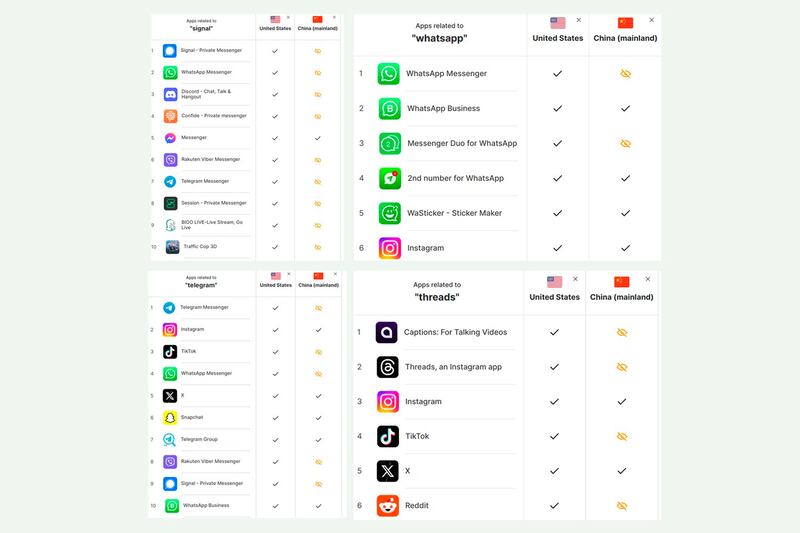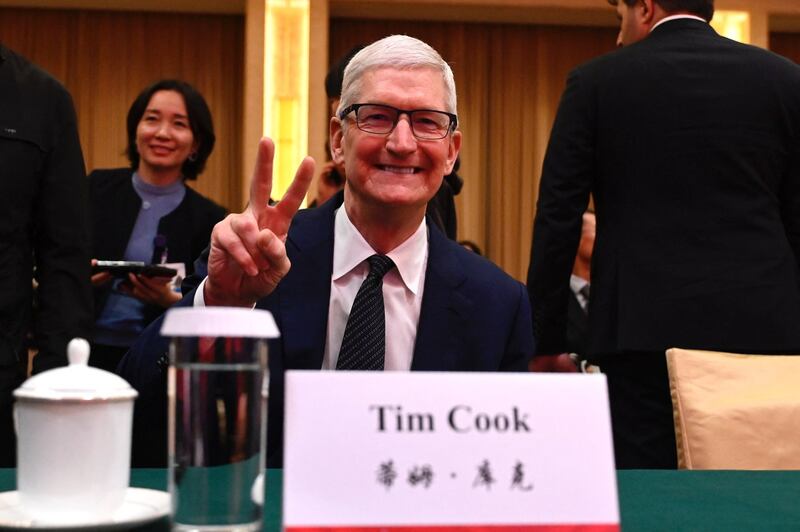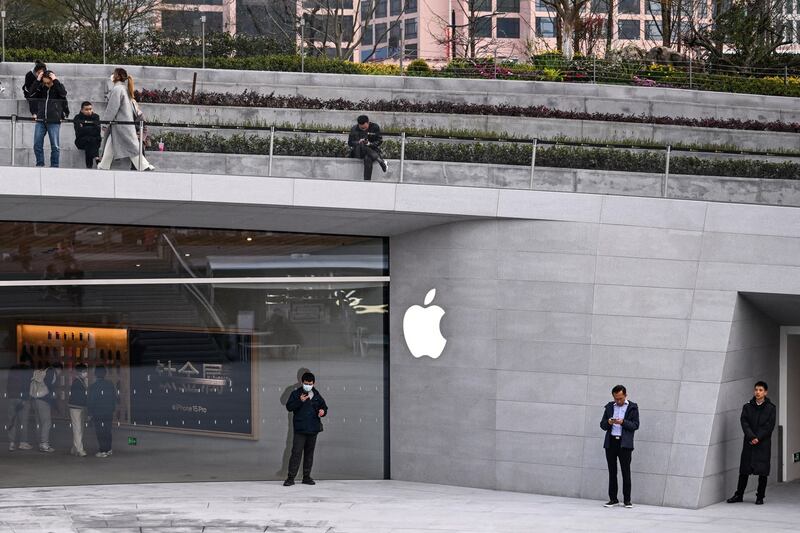Apple’s app store in China has taken down at least four chat apps that are widely used internationally, sparking concerns over the impact on the free flow of information and freedom of speech among users of its products in the country.
Apple told Reuters on Friday that it had removed Meta Platforms' messaging apps WhatsApp and Threads from the China App Store on orders from the government due to "national security" concerns.
The app-tracking site Apple Censorship showed that the two apps were no longer available in China, while two other encrypted messaging apps -- Telegram and Signal -- were also taken down from the store on Friday.
Commentators told Radio Free Asia that the move could be a preemptive form of retaliation ahead of the passage of a bill in the U.S. House of Representatives on Saturday that targets the Chinese social media app TikTok.
The removal also comes as the ruling Chinese Communist Party under Xi Jinping steps up a " national security" political campaign encouraging members of the public to look out for suspicious activity by potential foreign-backed actors in their everyday lives.

According to Apple Censorship, Facebook, Instagram and Messenger, all Meta products, were still available to download as of 1230 GMT on Monday, as were YouTube and X.
"The Cyberspace Administration of China ordered the removal of these apps from the China storefront based on their national security concerns," Apple said in an emailed statement to Reuters on Friday.
"We are obligated to follow the laws in the countries where we operate, even when we disagree," the statement said, but didn't explain how the apps could have generated national security concerns.
The Cyberspace Administration of China also did not immediately respond to a request for comment from Reuters or specialist media TechCrunch.
However, the agency announced last August that all app stores would need to go through a registration process to continue operating in China, and the move could be a part of that process.
A tech industry worker who asked to remain anonymous for fear of reprisals said he was disappointed in Apple over the takedown of the apps.
"The reason we all like Apple's products is that its high level of technology can offer us freedom of information," the worker said. "But when it comes to China, Apple just kneels down."
While Apple products, particularly devices bought outside of China, have a reputation as a relatively secure option for anyone wishing to evade government monitoring, questions remain about their ability to protect users' privacy in an all-encompassing surveillance state like China.

The tech industry worker cited the example of Apple’s AirDrop file sharing system, long regarded by the authorities as problematic because it offers a way for people to share content without going through the country's tightly monitored and heavily censored internet.
The Beijing municipal judicial affairs bureau said on Jan. 8, 2024 that it had managed to de-anonymize AirDrop users, sending a warning to anyone hoping to share banned content without triggering censorship alerts or leaving evidence that might be used to target them in criminal proceedings.
"Apple continues to castrate itself," the tech industry worker said. "Is this the same Apple that refused to hand over user data to the FBI in the United States? They are using double standards so as to access the Chinese market."
He said it was possible that the move is a form of retaliation for current attempts to ban TikTok in the United States.
"I suspect that the Chinese government is taking this opportunity to retaliate," they said. "Apple has become a tool of the Chinese government."
U.S.-based legal scholar Teng Biao agreed.
"TikTok is of strategic significance to the Chinese Communist Party ... so it's inevitable that they will find ways to fight back," Teng said.
But he said there is a big difference between the national security concerns cited in the United States TikTok bill, and those cited by China.

"In Chinese Communist Party strategic discourse, national security actually means the security of the Chinese Communist Party," Teng said. "So according to that logic, using WhatsApp or any other app to spread information freely would allow more liberal and democratic ideas to spread, which would threaten the Communist Party's grip on power."
He said the breaking of AirDrop for Chinese users came after lone protester Peng Lifa hung banners calling for democratic government and for Xi Jinping to step down from a traffic flyover in Beijing in October 2022, just days before the 20th party congress nodded through an unprecedented third and indefinite term in office for Xi.
"This approach may be to [Apple's] economic benefit in the short term, but will harm them in the long term," Teng said.
The controversy over app store takedowns comes after Apple's Tim Cook visited China last month, underscoring the country's importance to the company, which was the country's top seller of smartphones, holding 17.3% of market share, according to IDC Research.
Yet Chinese iPhone sales slumped 24% from a year ago in the first few weeks of 2024, according to research from Counterpoint Research.
In February 2023, Apple took down Damus, a Twitter-like social media app linked to Jack Dorsey's Nostr social media platform, after the Chinese authorities said it had failed a security assessment.
That app was likely banned because of its lack of content moderation, and because it offered access to trading platforms for cryptocurrencies like Bitcoin, which are technically banned in China, industry analysts said at the time.
Shares in Apple tumbled in September 2023 after the Chinese authorities reportedly banned the use of foreign-made electronics including Apple's iPhone for government business.
Translated by Luisetta Mudie. Edited by Eugene Whong .
